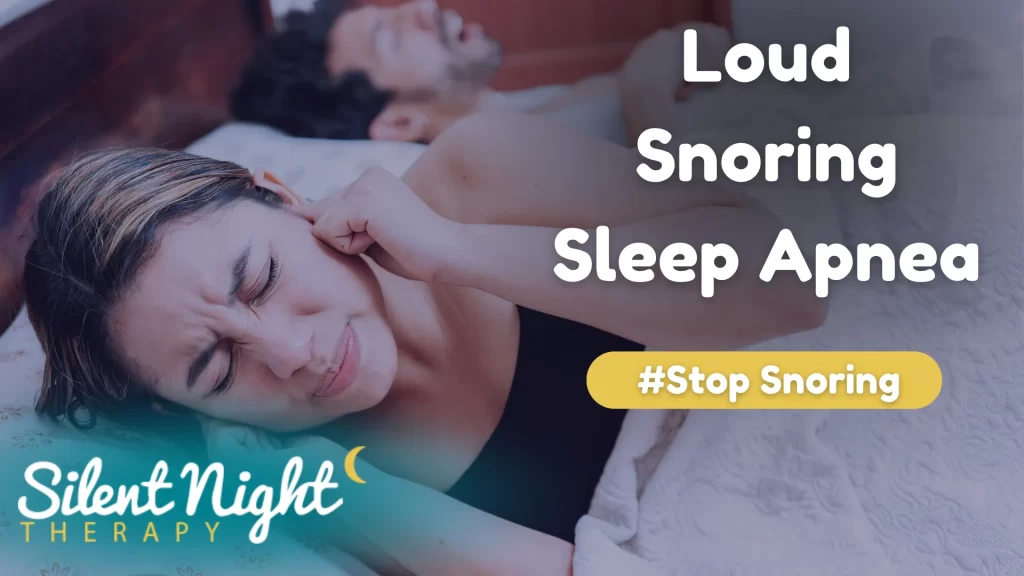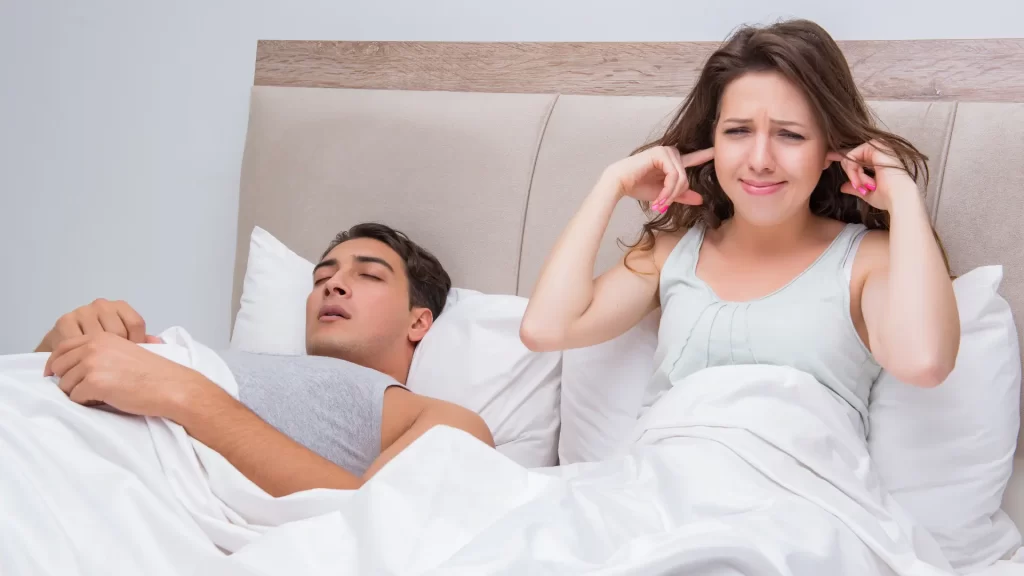Posted on Sunday, February 25th, 2024 at 8:17 pm
For many people, snoring is little more than an embarrassment or annoyance. For others, however, snoring can indicate an underlying health issue. Loud snoring is a warning sign that your upper airway might be obstructed and is associated with obstructive sleep apnea (OSA), a sleep disorder affecting 39 million U.S. adults. Not all snorers have apnea, but the two often go hand-in-hand. As snoring gets louder, the chances of having sleep apnea increase.
Snoring is caused by air squeezing through narrowed or blocked airways. The lungs need to inhale harder to compensate for the reduced air the body is getting. The snoring comes from the vibration of the soft palate at the back of the mouth and the uvula, which extends down and covers the airway. Some snorers have such severe air blockage that they don’t get a good night’s sleep. This condition is known as sleep apnea.
If you have sleep apnea, you usually begin snoring heavily soon after falling asleep. The snoring often becomes very loud and is accompanied by silence when breathing stops or nearly stops. The reduction or pause in breathing signals your body to wake up, and you may awaken with a loud snort or gasping sound as you try to breathe. This pattern repeats itself throughout the night.
If you or your bed partner have witnessed loud snoring followed by pauses in breathing, you may want to be evaluated for possible sleep apnea.
Effects of Loud Snoring on Health
Sleep apnea that goes undiagnosed can lead to constant loud snoring, causing increased health risks and decreased quality of life. In addition to disrupting your partner’s sleep, snoring associated with sleep apnea is likely interrupting your sleep quality and may even be straining your heart. The condition may put you at risk for health complications, including:
- Gasping, choking, and sleep disturbances
- Daytime fatigue
- Difficulty concentrating
- Frequent irritability, anxiety, or depression
- Chronic headaches
- Increased chance of stroke
- Cardiovascular problems leading to death
- Build-up in the arteries of calcium, fats, fibrin, and cholesterol
- Increased risk of heart attack and heart disease
- Increase of stress hormones in the body
- Increased risk of behavior problems in children with sleep apnea, including aggression or learning problems
- Increased risk of accidents (motor vehicle, machine operation, or falls) due to lack of sleep
Treatment Options for Loud Snoring and Sleep Apnea
For some snorers, the following lifestyle changes can help to improve symptoms:
- Losing weight
- Avoid alcohol consumption close to bedtime
- Quit smoking
- Sleep on your side
- Try mouth exercises to strengthen your tongue, soft palate, and throat muscles
In addition to lifestyle changes, other over-the-counter and surgical treatment options exist, including:
- Nasal strip or dilator: Wearing a nasal strip or dilator at night can improve airflow and reduce snoring. Nasal strips and dilators are generally available over the counter.
- Oral Appliances: Sleep apnea mouth guards are form-fitting dental appliances that reposition your jaw, tongue, or soft palate to open the airway during sleep. There are two types of mouthguards:
- Mandibular advancement devices (MADs): A dentist molds these mouthguards to fit your teeth and adjusts them to move your lower jaw forward. The jaw realignment helps eliminate snoring.
- Tongue retaining device or tongue stabilizing device (TRD or TSD): This mouth guard fits between your teeth and holds your tongue in place. The mouthpiece has a suction that prevents your tongue from falling back into your throat and blocking the airway.
- Continuous positive airway pressure (CPAP): Most often used to treat snoring associated with sleep apnea, CPAP involves wearing a mask over your nose or mouth while you sleep. The mask sends pressured air from a small bedside pump to open your airway at night.
- Implants: A palatal implant is a minimally invasive surgery option that stiffens the soft palate to reduce snoring.
- Laser-assisted uvulopalatoplasty: In laser-assisted uvulopalatoplasty, a surgeon removes tissue in the throat and soft palate to increase airflow.
While all the above options can be effective, it depends on the individual. There is no ‘one size fits all’ solution. Individuals who chronically snore shouldn’t self-diagnose or self-treat sleep apnea but should consult a medical professional to evaluate their symptoms.
Contact Silent Night Therapy Today
At Silent Night Therapy, we have treated patients with snoring problems and sleep-related breathing disorders since 1983. If you suffer from chronic, loud snoring, contact us today for a consultation or call us at 631-983-2463. Our sleep apnea specialists can help you get your sleep back on track. It’s time for a good night’s sleep.

